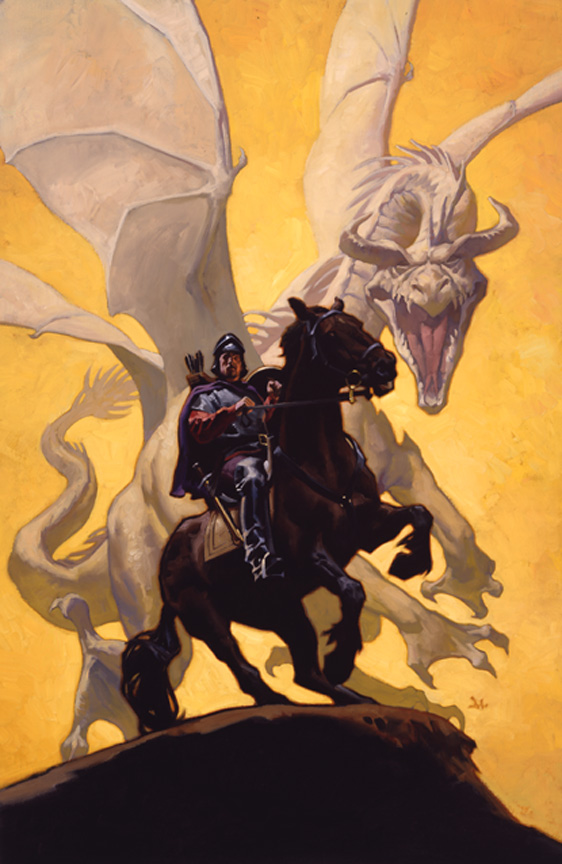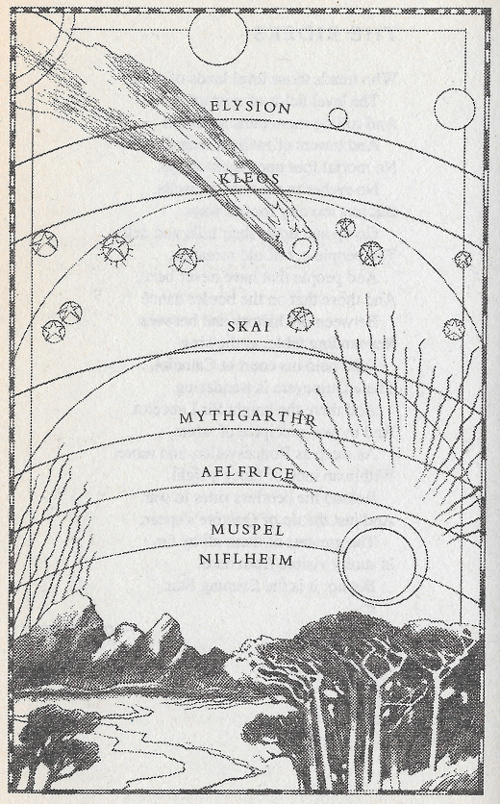100 Followers Thread: First of all, thank you to everyone!
Gene Wolfle (1931-2019) was a brilliant Catholic Speculative Fiction author and Engineer, most famous for his massive three-part epic & #39;The Solar Cycle& #39; and the invention of the Pringles machine. But today I want to...
Gene Wolfle (1931-2019) was a brilliant Catholic Speculative Fiction author and Engineer, most famous for his massive three-part epic & #39;The Solar Cycle& #39; and the invention of the Pringles machine. But today I want to...
examine one of his more recent and lesser-known works, a two-part novel entitled & #39;The Wizard Knight& #39; (2004), and explore how this novel acts as a modern addition to the Medieval genre of Specula Principum, or "Mirror of Princes."
Written in a more straightforward style than...
Written in a more straightforward style than...
the expressively baroque prose of & #39;The Book of the New Sun,& #39; The Wizard Knight tells the story of Able, an American boy transported into the world of Mythgarthr by transgressing a sacred boundary which he must make right. In this retelling of the Percival myth, Able assumes...
the role of the naive aspiring knight, who grows in the knightly virtues through the inspiring example of other knights, Divine assistance, and eventually achieving the sacred sword Eterne.
There are many aspects and hidden depths to the seemingly simple adventures presented...
There are many aspects and hidden depths to the seemingly simple adventures presented...
in The Wizard Knight, far too many to delve into in this thread. Therefore I want to focus on how Wolfe conveys his lessons of virtue through teaching, example, & typology, all elements which constitute the Mirror of Princes as a genre. While the Medieval Mirrors would draw on...
historical (often "legendary") and biblical narratives to provide a framework, Wolfe uses a carefully constructed cosmology of seven realms, from the Divine realm of the Most High God to the pathetic evil of the "most low god," the Cosmos is hierarchical, honor corresponds to...
duty. Though each realm is less perfect than the last, each finds its perfection in the example of the higher realm; as the angels of Kleos are to the "gods" of Skai, so are they to men, embodiments of the ideal of honor, and so are Men to the aelf of Aelfrice. So too are...
the Knights (who after all are a kind of prince, a servant who leads his people from the frontlines) to ordinary men, examples of honor- not in the shallow sense of recognition or reward, but as his mentor Sir Ravd teaches Able, Divine Honor flowing from "strength and wisdom"...
When Able comes into Mythgarthr this hierarchy of worlds has already been overturned, men have begun to worship the aelf through superstition, ignorance, and indolence. The aelf in turn, have summoned the dragons of Muspel as their gods and threaten the physical realm. Able...
must overcome the dragons, but he cannot do it alone. Not only does he gather many faithful retainers from the outcasts of society (a common trope of the Mirrors c.f. The Admonitions of St. Stephan), he receives the counsel of an Archangel, and when his climactic battle with...
the Satanic dragon comes, the Griffin, a medieval Christological symbol (Christ& #39;s Human and Divine natures being represented as the Divine Eagle & the Davidic Lion) supports him and bears him towards his sacrificial act. Having become an example of supreme sacrifice, Able returns
with supernatural power and wisdom, becoming the "Wizard-Knight" of the title, equipped with a magic helm which grants him the ability to see things, not as they appear, broken and marred by sin, but as they truly are and are meant to be, an indispensable quality in any ruler...
Despite his supreme worthiness, he does not usurp the rightful ruler of his kingdom, the dark king Arnthor, and even when wrongfully imprisoned on accusations of treason, he does not use his power against his king. Here Able embodies the Medieval conception of fidelity, which...
becomes crucial to the arc of his character and the salvation of his world.
There are many more aspects of the Mirror I could explore, but I will finish by noting that the novel is written in epistolary form, a standard in the genre of Mirrors. For a good example of one such...
There are many more aspects of the Mirror I could explore, but I will finish by noting that the novel is written in epistolary form, a standard in the genre of Mirrors. For a good example of one such...
Medieval Mirror of Princes, this blog has a breakdown of a key Carolingian text: https://acoup.blog/2020/03/27/a-trip-through-dhuoda-of-uzes-carolingian-values/
If">https://acoup.blog/2020/03/2... you are interested in learning more about & #39;The Wizard Knight& #39; before buying it, here is an interview with Wolfe himself explaining the book: https://www.youtube.com/watch?v=t_mEpLK8cWE">https://www.youtube.com/watch...
If">https://acoup.blog/2020/03/2... you are interested in learning more about & #39;The Wizard Knight& #39; before buying it, here is an interview with Wolfe himself explaining the book: https://www.youtube.com/watch?v=t_mEpLK8cWE">https://www.youtube.com/watch...
Small addendum: The Wizard Knight can also be seen as a expansion of the values Wolfe expressed in his tribute to Tolkien (found here: http://www.scifiwright.com/2015/10/the-best-introduction-to-the-mountains-2/">https://www.scifiwright.com/2015/10/t... )
"We might have a society in which the laws were few and just, simple, permanent, and familiar to everyone — a society in which everyone stood shoulder-to-shoulder because everyone lived by the same changeless rules, and everyone knew what those rules were."

 Read on Twitter
Read on Twitter



